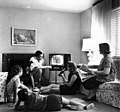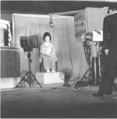Portal:Television
The Television Portal

Television (TV) is a telecommunication medium for transmitting moving images and sound. Additionally, the term can refer to a physical television set, rather than the medium of transmission. Television is a mass medium for advertising, entertainment, news, and sports. The medium is capable of more than "radio broadcasting", which refers to an audio signal sent to radio receivers.
Television became available in crude experimental forms in the 1920s, but only after several years of further development was the new technology marketed to consumers. After World War II, an improved form of black-and-white television broadcasting became popular in the United Kingdom and the United States, and television sets became commonplace in homes, businesses, and institutions. During the 1950s, television was the primary medium for influencing public opinion. In the mid-1960s, color broadcasting was introduced in the U.S. and most other developed countries.
In 2013, 79% of the world's households owned a television set. The replacement of earlier cathode-ray tube (CRT) screen displays with compact, energy-efficient, flat-panel alternative technologies such as LCDs (both fluorescent-backlit and LED), OLED displays, and plasma displays was a hardware revolution that began with computer monitors in the late 1990s. Most television sets sold in the 2000s were flat-panel, mainly LEDs. Major manufacturers announced the discontinuation of CRT, Digital Light Processing (DLP), plasma, and even fluorescent-backlit LCDs by the mid-2010s. LEDs are being gradually replaced by OLEDs. Also, major manufacturers have started increasingly producing smart TVs in the mid-2010s. Smart TVs with integrated Internet and Web 2.0 functions became the dominant form of television by the late 2010s. (Full article...)
Selected article -
Horrible Histories is a British children's live-action historical and musical sketch comedy television series, based on the bestselling book series of the same name by Terry Deary. The show was produced for CBBC by Lion Television with Citrus Television and ran from 2009 to 2014 for five series of thirteen half-hour episodes, with additional one-off seasonal and Olympic specials.
The TV show carries over the graphic style and much of the content of the Horrible Histories book series. It maintains the franchise's overall irreverent but accurate focus on the dark, gruesome or scatological aspects of British and other Western world history, spanning predominantly from the Stone Age to the post-World War II era. Individual historical eras or civilisations are defined and named as in the books, with sketches from several different time periods combined within a single episode. Live-action sketches—which often parody other UK media or celebrities—and music videos are intercut with animations and quizzes. The starring troupe are Mathew Baynton, Simon Farnaby, Martha Howe-Douglas, Jim Howick, Laurence Rickard, Ben Willbond and Sarah Hadland, alongside a large supporting cast headed by Katy Wix, Lawry Lewin, Alice Lowe and Dominique Moore. The black rat puppet "host", Rattus Rattus, appears in short bridging segments, explaining the factual basis for each sketch and helping children understand the facts.
Selected image -

High-definition television (HDTV) is a digital television broadcasting system with greater resolution than traditional television systems (NTSC, SECAM, PAL). HDTV is digitally broadcast, because digital television (DTV) requires less bandwidth if sufficient video compression is used. HDTV technology was introduced in the United States in the 1990s by the Digital HDTV Grand Alliance, a group of television companies.
Did you know (auto-generated) -

- ... that when acting in HBO television series Big Little Lies, Darby Camp received suggestions from Reese Witherspoon, who plays her onscreen mother?
- ... that Ukrainian actress Oksana Shvets, who was killed in the 2022 invasion of Ukraine, starred in the 2013 joint Ukrainian–Russian television family saga House with Lilies alongside Russian actors?
- ... that an NFL scheduling decision forced ESPN to change the kickoff times and television networks of the 2022 Las Vegas Bowl and the 2022 New Mexico Bowl?
- ... that the exclusive secret society Hamilton House from the television show Gossip Girl was based on St. Anthony Hall, a social and literary fraternity?
- ... that before being restored as a Broadway theater, the Ritz Theatre was used as a television studio, pornographic theater, vaudeville house, children's theater, and poster warehouse?
- ... that Digital pulled their HiNote Ultra laptop out of a manila envelope on television nearly 15 years before Apple did the same?
Selected quote -
More did you know
- ...that copies of the 1982 biopic Will: G. Gordon Liddy, about a Watergate co-conspirator, are stored in the Nixon Presidential Materials collection at the U.S. National Archives?
- ...that Molly Badham, co-founder of Twycross Zoo, trained the chimpanzees who appeared in the long-running Brooke Bond PG Tips television advertisements?
- ...that Black Entertainment Television comedy series We Got to Do Better, had its name changed from Hot Ghetto Mess amidst allegations of enforcing negative stereotypes of African Americans?
- ...that the final episode of the 1986 television series Outlaws recycled footage from The Oregon Trail, because actors Rod Taylor and Charles Napier appeared in both programs?
- ...that the Zambian district of Chiengi has no television or telephone service?
Selected biography -
William Bradley Pitt (born December 18, 1963) is an American actor and film producer. He is the recipient of various accolades, including two Academy Awards, two British Academy Film Awards, two Golden Globe Awards, and a Primetime Emmy Award. One of the most influential celebrities, Pitt appeared on Forbes' annual Celebrity 100 list from 2006 to 2008, and the Time 100 list in 2007.
Pitt first gained recognition as a cowboy hitchhiker in the Ridley Scott road film Thelma & Louise (1991). His first leading roles in big-budget productions came with the drama films A River Runs Through It (1992) and Legends of the Fall (1994). He also starred in the horror film Interview with the Vampire (1994), alongside Tom Cruise. He gave critically acclaimed performances in David Fincher's crime thriller Seven (1995) and the science fiction film 12 Monkeys (1995). The latter earned him a Golden Globe Award for Best Supporting Actor and his first Academy Award nomination. (Full article...)General images
Main topics
History of television: Early television stations • Geographical usage of television • Golden Age of Television • List of experimental television stations • List of years in television • Mechanical television • Social aspects of television • Television systems before 1940 • Timeline of the introduction of television in countries • Timeline of the introduction of color television in countries
Inventors and pioneers: John Logie Baird • Alan Blumlein • Walter Bruch • Alan Archibald Campbell-Swinton • Allen B. DuMont • Philo Taylor Farnsworth • Charles Francis Jenkins • Boris Grabovsky • Paul Gottlieb Nipkow • Constantin Perskyi • Boris Rosing • David Sarnoff • Kálmán Tihanyi • Vladimir Zworykin
Technology: Comparison of display technology • Digital television • Liquid crystal display television • Large-screen television technology • Technology of television
Terms: Broadcast television systems • Composite monitor • HDTV • Liquid crystal display television • PAL • Picture-in-picture • Pay-per-view • Plasma display • NICAM • NTSC • SECAM
Categories
WikiProjects

|
You are invited to participate in WikiProject Television, a WikiProject dedicated to developing and improving articles about Television. |
- Main projects
- Sub-projects
Television Stations • American animation • American television • Australian television • British TV • BBC • Canadian TV shows • Television Game Shows • ITC Entertainment Productions • Digimon • Buffyverse • Doctor Who • Degrassi • EastEnders • Episode coverage • Firefly • Futurama • Grey's Anatomy • Indian television • Lost • Nickelodeon • The O.C. • Professional Wrestling • Reality TV • The Simpsons • Seinfeld • South Park • Stargate • Star Trek • Star Wars • Soap operas • Avatar: The Last Airbender • House
- Related projects
Animation • Anime and manga • Comedy • Comics • Fictional characters • Film • Media franchises
What are WikiProjects?
Things you can do

- Place the {{WikiProject Television}} project banner on the talk pages of all articles within the scope of the project.
- Write: Possible Possum
- Cleanup: color television, Alien Nation: Body and Soul, The Sopranos, Alien Nation: Dark Horizon, Alien Nation: The Enemy Within, Alien Nation: Millennium, Aang
- Expand: Timeline of the introduction of color television in countries
- Stubs: Flow (television), Just for Kicks (TV series), Play of the Month, Nova (Dutch TV series), More stubs...
Subportals
Related portals
Associated Wikimedia
The following Wikimedia Foundation sister projects provide more on this subject:
-
Commons
Free media repository -
Wikibooks
Free textbooks and manuals -
Wikidata
Free knowledge base -
Wikinews
Free-content news -
Wikiquote
Collection of quotations -
Wikisource
Free-content library -
Wikiversity
Free learning tools -
Wiktionary
Dictionary and thesaurus














.jpg/120px-Samsung_Smart_TV_2012_(E-Series).jpg)














.jpg/220px-Katy_Perry_-_Part_Of_Me_Australian_Premiere_-_June_2012_(7).jpg)































